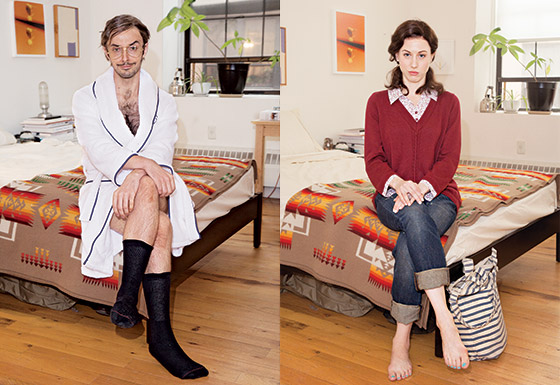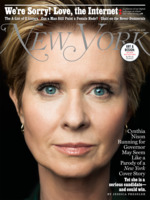 |
(Photo: Peter Funch) |
When Gebbia sent him a pair of CritBuns, Chesky had a revelation. “I was like, Wow,” he says. “ ‘He did it. He’s doing it!’ ” When a spot opened up in Gebbia’s loft, he decided to move there. “It felt like San Francisco was where it was all happening,” he says. “Like, if you were a painter in the 1400s, you wanted to be in Italy.”
Not surprisingly, CritBuns was not a worldwide sensation, and by the time Chesky arrived, Gebbia was on the verge of losing the loft Chesky was supposed to move into. “I had $1,000 in the bank,” Chesky says. “And I hadn’t planned to do any of this. And so we’re talking and we realized there’s an international design conference that’s coming to San Francisco. And so Joe said, ‘We should just create a bed-and-breakfast at the conference.’ ”
Gebbia had three air beds from a camping trip, and his former roommate Nathan Blecharczyk designed a website for them at Airbedandbreakfast.com. The first weekend, they had three guests.
“We’d make them breakfast in the morning—we would get fresh OJ and the best Pop-Tarts that you could imagine,” says Chesky. “We’d give them change to give to people when they walk through the Tenderloin.”
“It’s part of the San Francisco experience,” explains Gebbia.
“The more important thing is we actually made friends,” says Chesky. It was like The Real World, but less dramatic. “And after waving them good-bye, we realized: There’s a bigger idea here.”
“What if,” says Gebbia, “you could book a room in someone’s home as easily as you could a hotel?” He pauses. “Actually, it took a while for us to get to that.”
At first they stuck with the concept of air mattresses at conferences, which they promoted at the Democratic and Republican National Conventions in 2008 by making commemorative boxes of “Obama O’s” and “Captain McCain’s” cereal that they designed and hot-glued together in their kitchen. “I remember thinking to myself, like, Did Mark Zuckerberg ever make cereal?” says Chesky.
“At this point, we were each $20,000 to $30,000 in debt,” says Gebbia. Did they consider getting jobs at, like, a coffee shop?
“No way,” Gebbia says automatically.
“Picasso said that, like, creativity comes from constraints,” says Chesky. He has developed the start-up founder’s tic of sprinkling one’s speech with quotes and anecdotes from great men that subtly imply belonging in the same class of genius. (In fact, Picasso said no such thing. While the website startupquote.com attributes the line to Twitter founder Biz Stone, it’s most likely from a psychology book called Creativity From Constraint, which discusses how Picasso and Braque created Cubism by imposing restrictions on their painting. But hey, the man is designing the world around him.)
Chesky talks the talk, but five years ago, he was still very much an outsider, so much so that when a friend offered to introduce them to some angel investors, he actually thought the guy believed in angels. “And he’s like, ‘No, don’t worry. They’re people, and they’ll give you a $20,000 check over dinner.’ ”
One of those people was Paul Graham, a founder of tech incubator Y Combinator and the Zeus of Silicon Valley, from whose head many start-up quotes hath sprung. “He said, ‘Find 100 people that love you,’ ” says Gebbia. “Because it’s better to have 100 people love you than a million people or users that just kinda like you.” At that point, Airbedandbreakfast.com did not have a lot of users, but the greatest concentration of them was in New York. “So Paul Graham said, ‘Go to New York!’ ” says Gebbia.
At first, Airbnb—they shortened the name in 2009—was a hit mainly with their peers: millennials who were a tad more discriminating than the kids who booked with Couchsurfing.com. As the number of listings increased, the customer base grew, and it became a bona fide substitute for hotels. Then the financial crisis happened, and it became “so much more,” says Chesky.
He pulls up an email on his phone from a host who’d rented out her place on the site in 2009: “ ‘Hi Airbnb, I’m not exaggerating when I tell you that you literally saved us,’ ” he reads. “ ‘My husband and I just married after having lost our jobs and investments in the stock-market crash. We watched our savings dwindle to a point where we didn’t have enough money to pay our own rent … You gave us the ability to keep our home.’
“Like I say,” Gebbia says solemnly. “We don’t provide houses; we provide home.”
If the crash had never happened, Airbnb’s success may have been more gradual. But conditions were conducive to rapid growth. Not only were people looking to save money; they were pissed at being exploited by the system, and using the site felt gratifyingly subversive. For hosts, there was a beautiful kind of symmetry to it: Banks had leveraged people’s homes to make money; now they could do it for themselves. And guests liked that when they stayed at an Airbnb, they were paying a person, not a corporation.







